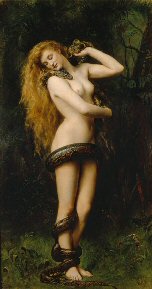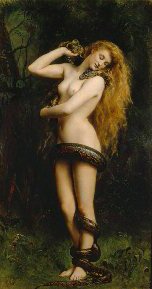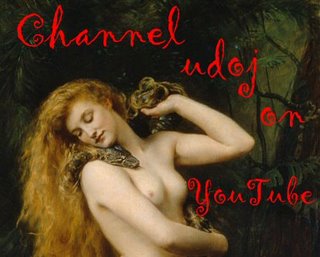-
On 7/17/2006 08:40:00 PM, JanieBelle waxed damned near poetic whilst opining...
-
That he did in the general bosom reign
Of young, of old; and sexes both enchanted,
To dwell with him in thoughts, or to remain
In personal duty, following where he haunted:
Consents bewitch'd, ere he desire, have granted;
And dialogued for him what he would say,
Ask'd their own wills, and made their wills obey.
A Lover's Complaint
-
On 7/17/2006 08:49:00 PM, JanieBelle waxed damned near poetic whilst opining...
-
I'll add comentary tomorrow, there's something I want to say about this passage, but I'm finding it difficult to articulate.
J
-
On 7/17/2006 09:51:00 PM, blipey waxed damned near poetic whilst opining...
-
Alright, deep and sexy. Not the best part of my Shakespearean knowledge. He wasn't often outright deep and sexy at the same time in his plays. He was dark and sexy on occasion, and ruttingly sexy quite a bit, and even angry and sexy.
Fortunately, he wrote some poems. So, in tribute to your posting about the yin and the yang, here is a little of what the Bard had to say about complements:
Here the anthem doth commence:
Love and constancy is dead;
Phoenix and the turtle fled
In a mutual flame from hence.
So they lov'd, as love in twain
Had the essence but in one;
Two distincts, division none:
Number there in love slain.
Hearts remote, yet not assunder;
Distance, and no space was seen
'Twixt the turtle and his queen;
But in them it were a wonder.
So between them love did shine,
That the turtle saw his right
Flaming in the phoenix' sight:
Either was the other's mine.
-excerpted from The Phoenix & the Turtle
I've always like the pairing of two so unlike creatures into one essence. It's his shortest stand alone work (15 stanzas or so), counting the sonnets as a body of work. But it's so pretty.
-
On 7/17/2006 10:00:00 PM, blipey waxed damned near poetic whilst opining...
-
But, here's something a little more direct:
From King John.
Louis the Dauphin going off on Cardinal Pandulph of Rome. Now Louis is a young man and not real cutesy with words or thoughts. I love the end of his tirade, when everything is a double entendre:
...
Have I not heard these islanders shout out,
Vive le roi! as I have bank'd their towns?
Have I not here the best cards for the game,
To win this easy match play'd for a crown?
And shall I now give o'er the yielded set?
No, no, on my soul it never shall be said.
So take that, Cardinal. Every pubescent boy's afternoon.
-
On 7/17/2006 10:16:00 PM, JanieBelle waxed damned near poetic whilst opining...
-
Oh, subtle is so much better than rutting. We've tended to be a little loud about our randiness, but hey, it's all new still.
The elegence of the scalpel only comes after the brute force of the sword.
And you can quote me on that, I just made it up.
And as almost trite as it has become, Romeo's soliloquy under Juliet's window is some of the most beautiful verse ever put to paper, as far as I'm concerned.
It's so full of love, pining, devotion and yet the tearing angst of secret love... every teenager's secret torture chamber crush.
-
On 7/17/2006 10:18:00 PM, JanieBelle waxed damned near poetic whilst opining...
-
But, soft! What light through yonder window breaks?
It is the east, and Juliet is the sun!
Arise fair sun and kill the envious moon,
Who is already sick and pale with grief
That thou her maid are more fair than she.
Be not her maid, since she is envious.
Her vestal livery is but sick and green,
And none but fools do wear it. Cast it off.
It is my lady, oh, it is my love!
Oh, that she knew she were!
She speaks, yet she says nothing. What of that?
Her eye discourses, I will answer it.
I am too bold, 'tis not to me she speaks.
Two of the fairest stars in all the heaven,
Having some business do entreat her eyes
To twinkle in their spheres till they return.
What if her eyes were there, they in her head?
The brightness of her cheek would shame those stars
As daylight doth a lamp; her eyes in heaven
Would through the airy region stream so bright
That birds would sing and think it were not night.
See how she leans her cheek upon her hand!
Oh that I might be a glove upon that hand,
That I might touch that cheek!
-
On 7/17/2006 10:21:00 PM, JanieBelle waxed damned near poetic whilst opining...
-
It's what originally turned me on to Shakespeare. Once I read the whole thing, not just the first two lines, it moved me 'til I actually hurt inside.
I think every teenager, girl or guy, knows exactly what that feels like, and nobody has ever captured that feeling, that moment better.
-
On 7/17/2006 10:29:00 PM, blipey waxed damned near poetic whilst opining...
-
Oh, it certainly isn't trite. I think it is often thought of as overdone. Somewhat of a misnomer, IMO. People aren't terribly familiar with the cannon, so all they're familiar with is R&J. The play can be thought of as too common, that's too bad.
I must admit I was briefly percolating coffee in that camp myself. Three years ago, it was the subject of the summer theatre course I taught for high-schoolers. I really immersed myself in the play, both as a piece of literature and as a performance piece.
Now I'm a fan for life.
-
On 7/17/2006 10:42:00 PM, JanieBelle waxed damned near poetic whilst opining...
-
I'm all agreed, blipey. Trite isn't really the right word. And overdone isn't it, either.
It's sort of hiding in plain sight. Everyone and her mother knows the very first two lines, but I seriously doubt that 10% of the English speaking world have really read the rest of it. Sure, skimmed for the test next week, but not REALLY read it.
Thought about it.
Tasted it and savored it.
Swallowed and consumed it.
Grokked it.
:)
-
On 7/17/2006 10:49:00 PM, blipey waxed damned near poetic whilst opining...
-
Janiebelle said:
The elegence of the scalpel only comes after the brute force of the sword.
It certainly can, but do you not think it can go the other way, as well?
Your favorite verse seems to support that it can--and is behaps the better way to go. I have two basis for this. First, it seems Romeo wields the scalpel first, though not as well as he will. Even though he uses heavy analogies: climbing the wall, tearing the word, etc--he recognizes the need to couch them in gentler terms: love's light wings, the blessed moon that tips with silver, and so on.
Secondly, even though Romeo is a bit heavy, Shakespeare manage to create between the two of them a scene of surpassing tenderness. In recognizing this, saw the scalpel first and this caused you to stay and see if there was a sword following along behind.
-
On 7/17/2006 11:01:00 PM, JanieBelle waxed damned near poetic whilst opining...
-
blipey said:
It certainly can, but do you not think it can go the other way, as well?
I hadn't really ever thought about it, blipey. It really was just an off-the-cuff remark in regards to Kate and me.
Your reversal of my quote and application to R&J is quite good.
He certainly does begin with a (perhaps awkwardly weilded at first) scalpel and end with a sword.
I guess Kate and I may just be on the road less traveled, to tie in another of my all time favorite poems.
And yet, for all our shameless display on this blog, the truth is there is plenty of softly, delicately wielded scalpel.
While we enjoy the chandelier swinging, I think we both prefer the more gentle and quietly intimate moments.
-
On 7/17/2006 11:07:00 PM, blipey waxed damned near poetic whilst opining...
-
I think the sword to scalpel road is the most frequently travelled--nothing wrong with it. But, it is partially because it is the common road that we fall in love with the journey on the less travelled ones.
When someone catches us quietly off-guard, we are more likely to be moved farther off our safe ground. I think that maybe why the passage resonates with us so much...it is the very situation we would like to be familiar but isn't.
-
On 7/17/2006 11:16:00 PM, JanieBelle waxed damned near poetic whilst opining...
-
I love the way you see things, blipey. So clearly, yet so elegantly. I believe you could describe a tank, and still manage to make my belly quiver.
Yes, that was a compliment, though perhaps an odd one.
With that thought though, I'm going to say goodnight and follow my lover to Never Never Land, towards which she has quite the head start.
-
On 7/18/2006 09:16:00 PM, JanieBelle waxed damned near poetic whilst opining...
-
This seemed appropriate for the moment.
As you'll answer it, take heed
This Slave commit no Violence upon
Himself. I've been deceiv'd. The Publick Safety
Requires he should be more confin'd; and none,
No not the Princes self, permitted to
Confer with him. I'll quit you to the King.
Vile and ingrate! too late thou shalt repent
The base Injustice thou hast done my Love:
Yes, thou shalt know, spite of thy past Distress,
And all those Ills which thou so long hast mourn'd;
Heav'n has no Rage, like Love to Hatred turn'd,
Nor Hell a Fury, like a Woman scorn'd.
--The Mourning Bride Act III Scene ii
-
On 7/18/2006 09:17:00 PM, JanieBelle waxed damned near poetic whilst opining...
-
Oh, and that was a different Will.
Cosgreve.
-
On 7/18/2006 11:11:00 PM, blipey waxed damned near poetic whilst opining...
-
But, remember, there is no surer beauty than a woman loved:
Was this the face that launched a thousand ships
And burnt the topless towers of Ilium?
Sweet Helen, make me immortal with a kiss.
Her lips sucks forth my soul. See where it flies!
Come, Helen, come, give me my soul again.
Here will I dwell, for heaven be in these lips,
And all is dross that is not Helena.
-Marlowe, Dr. Faustus, Vi
-
On 7/18/2006 11:14:00 PM, blipey waxed damned near poetic whilst opining...
-
Before I get in trouble, I know that passage--in context--doesn't support my statemnet. But I've always liked the passage and especially what it could mean if Faustus was really an honest man.
-
On 7/19/2006 09:42:00 AM, blipey waxed damned near poetic whilst opining...
-
On a much more honest timbre, here's a passage about love from afar that is yet too close. My second favorite role I've been lucky enough to play: Pierce Kinsellagh, The Clearing, Act II.
Pierce: Perhaps I did want to see you. Perhaps I wanted to see if I could recognize Maddy O'Hart in the English lady you've become.
Madeleine: There is no English lady.
Pierce: I see one. Your father must be beating on the walls of Heaven.
Madeleine: My father counted many English among his friends.
Pierce: Before we knew their secret nature. Before we saw their true designs. You always did fancy queening it above the rest of us. Queen Maddy O'Hart.
Madeleine: How hard you are.
Pierce: I'm not the one who deserted my people. There was a time when we saw with the same eyes, when our hands felt empty, aimless, unless they held the other's. There was a time when I thought we would become one, not just our hands but our whole bodies, and we'd stay that way until we became three or four.
When we wrestled in the crackling heather, when we sat silent by the shore, that's what I was thinking, Maddy. That is what I thought.
I could've done that show forever (given that the producer had a money tree in his back yard...but she didn't...well, I might hav done it free for a while.)
-
On 7/19/2006 04:27:00 PM, JanieBelle waxed damned near poetic whilst opining...
-
Oh, blipey,
I'm so glad you posted that. Kate really loved the quote from Dr. Faustus when I read it to her, regardless of its being out of context. I found it moving, too. Any man who comes talking like that in my ear, gets what he wants whether he means it or not!
I had never actually read it, though I'm somewhat familiar with it in the abstract, so it's even specialererer because of its novelty.
Now I'm really interested in reading it, as well as The Clearing. I'd like to know about the context of both of those passages.
Madeleine: How hard you are.
I'm assuming she's referring to his heart here, but....
Thank you for both of those,
Kisses heaped on blipey
from bo'fus.
-
On 7/20/2006 12:04:00 AM, blipey waxed damned near poetic whilst opining...
-
It's not that I took the Marlowe passage out of context--more like I applied new context to it, something that was certainly not in the play.
Faustus, as you may know, sells his soul to the devil for earthly wealth and power (which he gets in abundance). Near the end of the show, he starts to see what he has truly done and what is fate will truly be. It is now that he travels to ancient Troy and sees Helen. It is not that he is in love with her, but more that she is such a striking soul that he is reminded very immediately that he has none. The combination of this assued knowledge and her unique attractiveness, causes him to plead with her for his soul.
Christopher Marlowe, incidentally, is often credited with inventing Elizabethan drama as we know it. Blank verse is sometimes referred to as "Marlowe's Mighty Line". While not the first to use it, he was very much more talented than his contemporaries. In early Elizabethan theatrer he was by far the most produced and most successful playwright.
He was killed in a bar fight when he was 26 years old, after writing only 6 plays. Perhaps the greatest tragedy western theatre has ever known. His plays are rarely produced today because they are slightly clunkier than Shakespeare better work. His women also tend to be flat and unappealing. But his plots and phrasing are sometimes miraculous to read--and he was killed before he even reached his prime.
If I were to recommend a show of his to start with, I would go with The Jew of Malta. Barabas is a fantastic sharacter...rivaling, or surpassing, Shylock or Othello for tragedy, in my opinion.
As for The Clearing, it is a contempory play by Helen Edmundson about the ethnic cleansing of the Irish by Oliver Cromwell. Maddy O'Hart and Pierce Kinsellagh were childhood sweethearts. As the English troubles grew, Pierce gravitated toward the rebellion and Maddy ended up marrying an Englishman.
The scene I quoted has Pierce returning to Maddy's home just after she has delivered her first baby. He speaks of old times as if they could be recaptured. She wants to move on with life--hers and his, and find a way to live as people, not English and Irish separately.
I heartily recommend reading it. A real tear-jerker with a lot of soul searching for all (characters and audience). The language is a bit stilted, but with the right cast and director, it can really sing.












